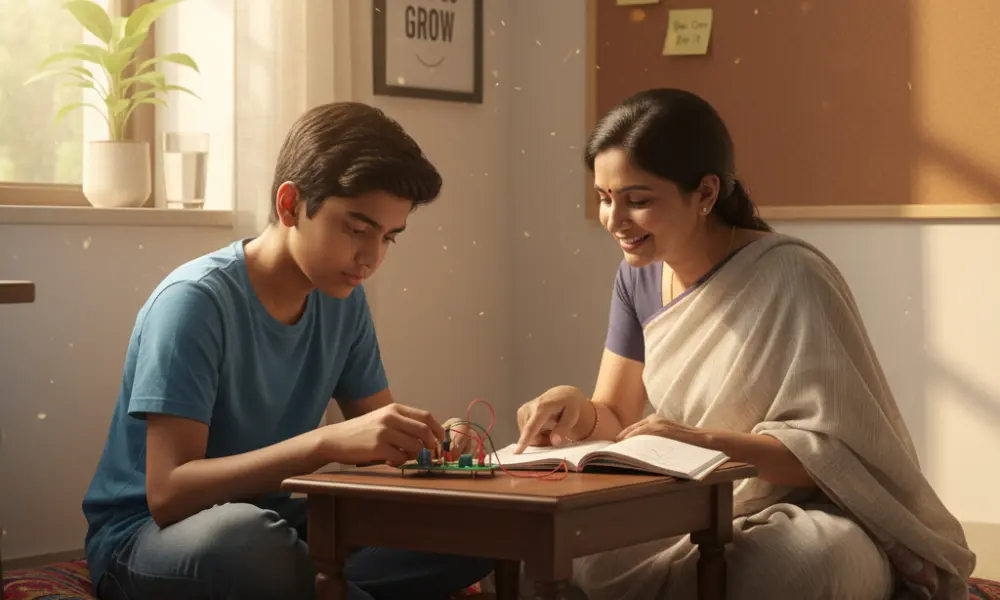How to differentiate peer pressure from healthy competition and guide your child toward positive motivation
This blog explores the fine line between peer pressure and healthy competition in academics. It highlights signs of harmful pressure, benefits of constructive competition, real-life examples, and practical strategies for parents and schools to keep students motivated in a balanced way.

In today’s academic environment, CBSE students often compare themselves to their peers. Peer pressure arises when this comparison shifts from being motivating to becoming stressful or damaging. Instead of focusing on personal progress, students may start studying only to outdo friends or avoid embarrassment. While some level of competition is natural, peer pressure creates anxiety, lowers self-esteem, and can even discourage children from subjects they once enjoyed. Parents should recognize that peer pressure is not about healthy learning but about external expectations overshadowing individual growth.
Unhealthy competition manifests in ways that parents and teachers can observe. Some warning signs include:
Children constantly comparing marks or ranks with classmates
Stress or mood swings after hearing about a peer’s achievements
Fear of failure instead of enthusiasm for learning
Overstudying or neglecting sleep and hobbies to keep up with others
Withdrawing socially due to feelings of inadequacy
If left unchecked, these signs may lead to burnout or disinterest in academics. Recognizing them early allows families to step in with reassurance and perspective.
Healthy competition, on the other hand, encourages growth without pressure. When framed positively, it pushes students to stretch their potential and learn teamwork. Benefits include:
Motivation to set personal academic goals
Improved discipline through consistent effort
Exposure to new study methods by observing peers
Higher resilience as students learn from both wins and setbacks
In CBSE classrooms, students often learn best when encouraged to challenge each other in quizzes, group projects, or collaborative study sessions. Such competition focuses on progress rather than comparison.
The psychological impact of competition depends on whether it is healthy or unhealthy. Positive competition boosts confidence and intrinsic motivation, while peer pressure creates performance anxiety. Students under constant comparison may internalize failure, leading to low self-worth. In contrast, when encouraged to compete healthily, children feel proud of their progress and build lifelong confidence in their abilities. Parents must understand that mental health and academic success are intertwined, and excessive pressure undermines both.
Parents play a crucial role in guiding children toward healthy competition. Here are some strategies:
Emphasize progress over rank — praise effort, not just marks
Encourage individual goal setting instead of peer comparisons
Model a balanced lifestyle that values academics along with rest and hobbies
Open conversations about stress and normalize setbacks as part of learning
Parents who focus on holistic development help children remain motivated without feeling burdened. Reminding children that exams are a step in learning, not the ultimate measure of success, prevents unnecessary anxiety.
Schools also shape how competition is perceived. Teachers can promote healthy rivalry by designing assessments that value creativity and teamwork, not just scores. Activities such as group debates, collaborative science experiments, and peer-to-peer teaching encourage cooperation alongside competition. Rewarding effort and improvement, not only top ranks, helps students see value in their own progress. Schools that integrate mental health awareness into academics create an environment where students thrive collectively rather than in isolation.
Consider the story of Aarav, a Class 10 student preparing for CBSE board exams. Initially, Aarav was demotivated because his friends consistently scored higher marks. With guidance from his parents and teachers, he shifted focus to his personal improvement. By practicing past papers, tracking his progress, and celebrating small achievements, Aarav regained confidence. Similarly, Ananya, a Class 9 student, once struggled with peer pressure in Mathematics. By joining a peer study group that emphasized collaboration, she learned new problem-solving techniques and began enjoying the subject. These real-life cases show that with the right support, students can overcome harmful comparisons and channel competition positively.
Balancing peer influence requires continuous awareness. Families and schools can work together to help students distinguish between healthy challenges and harmful pressure. Final strategies include:
Encouraging students to compete with their past performance rather than peers
Setting realistic goals that align with each child’s strengths
Maintaining open communication about stress, pressure, and achievements
Leveraging tools like Edzy’s gamified learning platform to make competition motivating and fun
Healthy competition is about learning and growth, while peer pressure is about comparison and fear. Recognizing the difference changes a student’s entire approach to academics.
When parents, schools, and students collectively embrace this perspective, academic journeys become more balanced, confident, and enjoyable. Edzy supports this vision by making learning interactive, rewarding progress, and transforming exams from a source of pressure into a pathway for growth.

Screen Time Management for Students: A Parent’s Step-by-Step Guide
A comprehensive guide for parents to manage their children's screen time effectively.

How Parents Can Build a Growth Mindset in Their Children
Empower your child with a growth mindset for lifelong learning.

The Role of Parents in Building Exam Confidence: Do’s and Don’ts
Practical do’s and don’ts for parents to boost their child’s exam confidence

Understanding Competency-Based Learning in CBSE: A Parent’s Guide
A practical guide for parents to understand CBSE’s shift toward competency-based learning